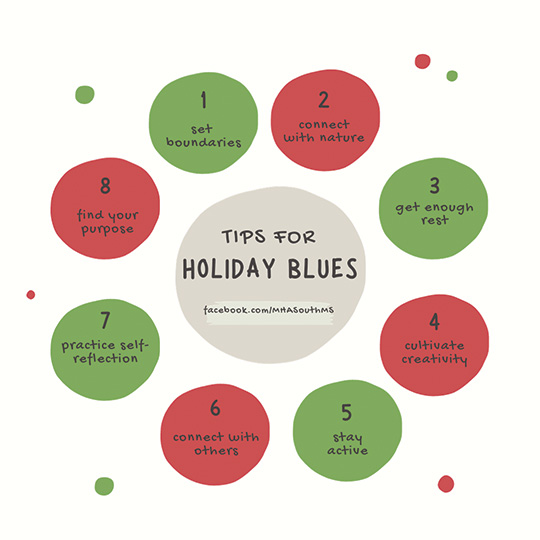By Kay Daneault
The holidays can be a time of joy, fellowship and happiness. However, they also can be a time of high emotion and trying to fulfill others’ expectations. For many, the festive season can bring feelings of anxiety, depression, loneliness and stress. According to the American Psychological Association, 38 percent of people surveyed said their stress increased during this period.
There is a difference between the holiday blues and seasonal affective disorder (SAD). Holiday blues usually start around November and dissipate toward the end of January; symptoms tend to be fairly mild. In contrast, SAD is a type of depression that’s related to seasonal change. There’s less sunshine during the winter, so people are more often affected; it is also typically more severe.
If the holidays are gone and you or someone you know is still feeling depressed or anxious, talk to a doctor or a mental health professional to determine the best way forward. At any time, someone in crisis can dial 988 to get help from a mental health professional. Mental Health America has great resources: https:// mhanational.org/holidays

TIPS FOR WEATHERING THE HOLIDAY BLUES
• Set boundaries. Boundaries are clear guidelines and limits surrounding how you want to be treated. They let others know what is and is not OK. Boundaries help to avoid burnout, stress and anxiety and prevent emotional and financial burdens.
• Connect with nature. Walk outside to focus on what you see, hear and feel.
• Get enough rest. The Sleep Foundation suggests sticking to a sleep schedule and routine. A sleep routine is the series of activities you undertake within an hour of bedtime.
• Cultivate creativity. According to Britannica, creativity is “the ability to make or otherwise bring into existence something new.” Maybe you will try a new recipe or create the next world-famous painting?
• Stay active. Set an alarm to stand up and stretch once an hour, or walk around your house/office for five minutes.
• Connect with others. Plan how you can positively respond to someone who may upset you during the holidays. Ask a friend if you can call or text if things get difficult.
• Practice self-reflection. Give yourself grace. You have the right to say, “I can’t this time,” or, “I can come, but only for a short time.”
• Find your purpose. Discover what drives and energizes you — what you love to do or always wished you could do.
Kay Daneault is executive director of the Mental Health Association of South Mississippi. Reach her at kdaneault@msmentalhealth.org



One Comment
Leave a Reply